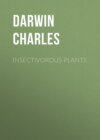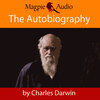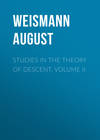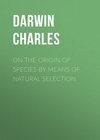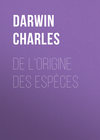Kitabı oku: «Insectivorous Plants», sayfa 12
I am well aware that this statement will at first appear incredible to almost everyone. Drosera is far from rivalling the power of the spectroscope, but it can detect, as shown by the movements of its leaves, a very much smaller quantity of the phosphate of ammonia than the most skilful chemist can of any substance.36 My results were for a long time incredible even to myself, and I anxiously sought for every source of error. The salt was in some cases weighed for me by a chemist in an excellent balance; and fresh water was measured many times with care. The observations were repeated during several years. Two of my sons, who were as incredulous as myself, compared several lots of leaves simultaneously immersed in the weaker solutions and in water, and declared that there could be no doubt about the difference in their appearance. I hope that some one may hereafter be induced to repeat my experiments; in this case he should select young and vigorous leaves, with the glands surrounded by abundant secretion. The leaves should be carefully cut off and laid gently in watch-glasses, and a measured quantity of the solution and of water poured over each. The water used must be as absolutely pure as it can be made. It is to be especially observed that the experiments with the weaker solutions ought to be tried after several days of very warm weather. Those with the weakest solutions should be made on plants which have been kept for a considerable time in a warm greenhouse, or cool hothouse; but this is by no means necessary for trials with solutions of moderate strength.
I beg the reader to observe that the sensitiveness or irritability of the tentacles was ascertained by three different methods – indirectly by drops placed on the disc, directly by drops applied to the glands of the outer tentacles, and by the immersion of whole leaves; and it was found by these three methods that the nitrate was more powerful than the carbonate, and the phosphate much more powerful than the nitrate; this result being intelligible from the difference in the amount of nitrogen in the first two salts, and from the presence of phosphorus in the third. It may aid the reader's faith to turn to the experiments with a solution of one grain of the phosphate to 1000 oz. of water, and he will there find decisive evidence that the one-four-millionth of a grain is sufficient to cause the inflection of a single tentacle. There is, therefore, nothing very improbable in the fifth of this weight, or the one-twenty-millionth of a grain, acting on the tentacle of a highly sensitive leaf. Again, two of the leaves in the solution of one grain to 3000 oz., and three of the leaves in the solution of one grain to 5000 oz., were affected, not only far more than the leaves tried at the same time in water, but incomparably more than any five leaves which can be picked out of the 173 observed by me at different times in water.
There is nothing remarkable in the mere fact of the one-twenty-millionth of a grain of the phosphate, dissolved in above two-million times its weight of water, being absorbed by a gland. All physiologists admit that the roots of plants absorb the salts of ammonia brought to them by the rain; and fourteen gallons of rain-water contain37 a grain of ammonia, therefore only a little more than twice as much as in the weakest solution employed by me. The fact which appears truly wonderful is, that the one-twenty-millionth of a grain of the phosphate of ammonia (including less than the one-thirty-millionth of efficient matter), when absorbed by a gland, should induce some change in it, which leads to a motor impulse being transmitted down the whole length of the tentacle, causing the basal part to bend, often through an angle of above 180 degrees.
Astonishing as is this result, there is no sound reason why we should reject it as incredible. Prof. Donders, of Utrecht, informs me that from experiments formerly made by him and Dr. De Ruyter, he inferred that less than the one-millionth of a grain of sulphate of atropine, in an extremely diluted state, if applied directly to the iris of a dog, paralyses the muscles of this organ. But, in fact, every time that we perceive an odour, we have evidence that infinitely smaller particles act on our nerves. When a dog stands a quarter of a mile to leeward of a deer or other animal, and perceives its presence, the odorous particles produce some change in the olfactory nerves; yet these particles must be infinitely smaller38 than those of the phosphate of ammonia weighing the one-twenty-millionth of a grain. These nerves then transmit some influence to the brain of the dog, which leads to action on its part. With Drosera, the really marvellous fact is, that a plant without any specialised nervous system should be affected by such minute particles; but we have no grounds for assuming that other tissues could not be rendered as exquisitely susceptible to impressions from without if this were beneficial to the organism, as is the nervous system of the higher animals.
CHAPTER VIII
THE EFFECTS OF VARIOUS OTHER SALTS AND ACIDS ON THE LEAVES
Salts of sodium, potassium, and other alkaline, earthy, and metallic salts – Summary on the action of these salts – Various acids – Summary on their action.
HAVING found that the salts of ammonia were so powerful, I was led to investigate the action of some other salts. It will be convenient, first, to give a list of the substances tried (including forty-nine salts and two metallic acids), divided into two columns, showing those which cause inflection, and those which do not do so, or only doubtfully. My experiments were made by placing half-minim drops on the discs of leaves, or, more commonly, by immersing them in the solutions; and sometimes by both methods. A summary of the results, with some concluding remarks, will then be given. The action of various acids will afterwards be described.
COLUMN 1: SALTS CAUSING INFLECTION. COLUMN 2: SALTS NOT CAUSING INFLECTION
(Arranged in Groups according to the Chemical Classification in Watts' 'Dictionary of Chemistry.')
Sodium carbonate, rapid inflection.: Potassium carbonate: slowly poisonous. Sodium nitrate, rapid inflection.: Potassium nitrate: somewhat poisonous. Sodium sulphate, moderately rapid inflection.: Potassium sulphate. Sodium phosphate, very rapid inflection.: Potassium phosphate. Sodium citrate, rapid inflection.: Potassium citrate. Sodium oxalate; rapid inflection. Sodium chloride, moderately rapid inflection.: Potassium chloride.
COLUMN 1: SALTS CAUSING INFLECTION. COLUMN 2: SALTS NOT CAUSING INFLECTION
(Arranged in Groups according to the Chemical Classification in Watts' 'Dictionary of Chemistry.')
Sodium iodide, rather slow inflection.: Potassium iodide, a slight and doubtful amount of inflection. Sodium bromide, moderately rapid inflection.: Potassium bromide. Potassium oxalate, slow and doubtful inflection.: Lithium nitrate, moderately rapid inflection.: Lithium acetate. Caesium chloride, rather slow inflection.: Rubidium chloride. Silver nitrate, rapid inflection: quick poison.: Cadmium chloride, slow inflection.: Calcium acetate. Mercury perchloride, rapid inflection: quick poison.: Calcium nitrate.: Magnesium acetate.: Magnesium nitrate.: Magnesium chloride.: Magnesium sulphate.: Barium acetate.: Barium nitrate.: Strontium acetate.: Strontium nitrate.: Zinc chloride.
Aluminium chloride, slow and doubtful inflection.: Aluminium nitrate, a trace of inflection. Gold chloride, rapid inflection: quick poison.: Aluminium and potassium sulphate.
Tin chloride, slow inflection: poisonous.: Lead chloride.
Antimony tartrate, slow inflection: probably poisonous. Arsenious acid, quick inflection: poisonous. Iron chloride, slow inflection: probably poisonous.: Manganese chloride. Chromic acid, quick inflection: highly poisonous. Copper chloride, rather slow in flection: poisonous.: Cobalt chloride. Nickel chloride, rapid inflection: probably poisonous. Platinum chloride, rapid inflection: poisonous.
Sodium, Carbonate of (pure, given me by Prof. Hoffmann). – Half-minims (.0296 ml.) of a solution of one part to 218 of water (2 grs. to 1 oz.) were placed on the discs of twelve leaves. Seven of these became well inflected; three had only two or three of their outer tentacles inflected, and the remaining two were quite unaffected. But the dose, though only the 1/480 of a grain (.135 mg.), was evidently too strong, for three of the seven well-inflected leaves were killed. On the other hand, one of the seven, which had only a few tentacles inflected, re-expanded and seemed quite healthy after 48 hrs. By employing a weaker solution (viz. one part to 437 of water, or 1 gr. to 1 oz.), doses of 1/960 of a grain (.0675 mg.) were given to six leaves. Some of these were affected in 37 m.; and in 8 hrs. the outer tentacles of all, as well as the blades of two, were considerably inflected. After 23 hrs. 15 m. the tentacles had almost re-expanded, but the blades of the two were still just perceptibly curved inwards. After 48 hrs. all six leaves were fully re-expanded, and appeared perfectly healthy.
Three leaves were immersed, each in thirty minims of a solution of one part to 875 of water (1 gr. to 2 oz.), so that each received 1/32 of a grain (2.02 mg.); after 40 m. the three were much affected, and after 6 hrs. 45 m. the tentacles of all and the blade of one closely inflected.
Sodium, Nitrate of (pure). – Half-minims of a solution of one part to 437 of water, containing 1/960 of a grain (.0675 mg.), were placed on the discs of five leaves. After 1 hr. 25 m. the tentacles of nearly all, and the blade of one, were somewhat inflected. The inflection continued to increase, and in 21 hrs. 15 m. the tentacles and the blades of four of them were greatly affected, and the blade of the fifth to a slight extent. After an additional 24 hrs. the four leaves still remained closely inflected, whilst the fifth was beginning to expand. Four days after the solution had been applied, two of the leaves had quite, and one had partially, re-expanded; whilst the remaining two remained closely inflected and appeared injured.
Three leaves were immersed, each in thirty minims of a solution of one part to 875 of water; in 1 hr. there was great inflection, and after 8 hrs. 15 m. every tentacle and the blades of all three were most strongly inflected.
Sodium, Sulphate of. – Half-minims of a solution of one part to 437 of water were placed on the discs of six leaves. After 5 hrs. 30 m. the tentacles of three of them, (with the blade of one) were considerably; and those of the other three slightly, inflected. After 21 hrs. the inflection had a little decreased, and in 45 hrs. the leaves were fully expanded, appearing quite healthy.
Three leaves were immersed, each in thirty minims of a solution of one part of the sulphate to 875 of water; after 1 hr. 30 m. there was some inflection, which increased so much that in 8 hrs. 10 m. all the tentacles and the blades of all three leaves were closely inflected.
Sodium, Phosphate of. – Half-minims of a solution of one part to 437 of water were placed on the discs of six leaves. The solution acted with extraordinary rapidity, for in 8 m. the outer tentacles on several of the leaves were much incurved. After 6 hrs. the tentacles of all six leaves, and the blades of two, were closely inflected. This state of things continued for 24 hrs., excepting that the blade of a third leaf became incurved. After 48 hrs. all the leaves re-expanded. It is clear that 1/960 of a grain of phosphate of soda has great power in causing inflection.
Sodium, Citrate of. – Half-minims of a solution of one part to 437 of water were placed on the discs of six leaves, but these were not observed until 22 hrs. had elapsed. The sub-marginal tentacles of five of them, and the blades of four, were then found inflected; but the outer rows of tentacles were not affected. One leaf, which appeared older than the others, was very little affected in any way. After 46 hrs. four of the leaves were almost re-expanded, including their blades. Three leaves were also immersed, each in thirty minims of a solution of one part of the citrate to 875 of water; they were much acted on in 25 m.; and after 6 hrs. 35 m. almost all the tentacles, including those of the outer rows, were inflected, but not the blades.
Sodium, Oxalate of. – Half-minims of a solution of one part to 437 of water were placed on the discs of seven leaves; after 5 hrs. 30 m. the tentacles of all, and the blades of most of them, were much affected. In 22 hrs., besides the inflection of the tentacles, the blades of all seven leaves were so much doubled over that their tips and bases almost touched. On no other occasion have I seen the blades so strongly affected. Three leaves were also immersed, each in thirty minims of a solution of one part to 875 of water; after 30 m. there was much inflection, and after 6 hrs. 35 m. the blades of two and the tentacles of all were closely inflected.
Sodium, Chloride of (best culinary salt). – Half-minims of a solution of one part to 218 of water were placed on the discs of four leaves. Two, apparently, were not at all affected in 48 hrs.; the third had its tentacles slightly inflected; whilst the fourth had almost all its tentacles inflected in 24 hrs., and these did not begin to re-expand until the fourth day, and were not perfectly expanded on the seventh day. I presume that this leaf was injured by the salt. Half-minims of a weaker solution, of one part to 437 of water, were then dropped on the discs of six leaves, so that each received 1/960 of a grain. In 1 hr. 33 m. there was slight inflection; and after 5 hrs. 30 m. the tentacles of all six leaves were considerably, but not closely, inflected. After 23 hrs. 15 m. all had completely re-expanded, and did not appear in the least injured.
Three leaves were immersed, each in thirty minims of a solution of one part to 875 of water, so that each received 1/32 of a grain, or 2.02 mg. After 1 hr. there was much inflection; after 8 hrs. 30 m. all the tentacles and the blades of all three were closely inflected. Four other leaves were also immersed in the solution, each receiving the same amount of salt as before, viz. 1/32 of a grain. They all soon became inflected; after 48 hrs. they began to re-expand, and appeared quite uninjured, though the solution was sufficiently strong to taste saline.
Sodium, Iodide of. – Half-minims of a solution of one part to 437 of water were placed on the discs of six leaves. After 24 hrs. four of them had their blades and many tentacles inflected. The other two had only their submarginal tentacles inflected; the outer ones in most of the leaves being but little affected. After 46 hrs. the leaves had nearly re-expanded. Three leaves were also immersed, each in thirty minims of a solution of one part to 875 of water. After 6 hrs. 30 m. almost all the tentacles, and the blade of one leaf, were closely inflected.
Sodium, Bromide of. – Half-minims of a solution of one part to 437 of water were placed on six leaves. After 7 hrs. there was some inflection; after 22 hrs. three of the leaves had their blades and most of their tentacles inflected; the fourth leaf was very slightly, and the fifth and sixth hardly at all, affected. Three leaves were also immersed, each in thirty minims of a solution of one part to 875 of water; after 40 m. there was some inflection; after 4 hrs. the tentacles of all three leaves and the blades of two were inflected. These leaves were then placed in water, and after 17 hrs. 30 m. two of them were almost completely, and the third partially, re-expanded; so that apparently they were not injured.
Potassium, Carbonate of (pure). – Half-minims of a solution of one part to 437 of water were placed on six leaves. No effect was produced in 24 hrs.; but after 48 hrs. some of the leaves had their tentacles, and one the blade, considerably inflected. This, however, seemed the result of their being injured; for on the third day after the solution was given, three of the leaves were dead, and one was very unhealthy; the other two were recovering, but with several of their tentacles apparently injured, and these remained permanently inflected. It is evident that the 1/960 of a grain of this salt acts as a poison. Three leaves were also immersed, each in thirty minims of a solution of one part to 875 of water, though only for 9 hrs.; and, very differently from what occurs with the salts of soda, no inflection ensued.
Potassium, Nitrate of. – Half-minims of a strong solution, of one part to 109 of water (4 grs. to 1 oz.), were placed on the discs of four leaves; two were much injured, but no inflection ensued. Eight leaves were treated in the same manner, with drops of a weaker solution, of one part to 218 of water. After 50 hrs. there was no inflection, but two of the leaves seemed injured. Five of these leaves were subsequently tested with drops of milk and a solution of gelatine on their discs, and only one became inflected; so that the solution of the nitrate of the above strength, acting for 50 hrs., apparently had injured or paralysed the leaves. Six leaves were then treated in the same manner with a still weaker solution, of one part to 437 of water, and these, after 48 hrs., were in no way affected, with the exception of perhaps a single leaf. Three leaves were next immersed for 25 hrs., each in thirty minims of a solution of one part to 875 of water, and this produced no apparent effect. They were then put into a solution of one part of carbonate of ammonia to 218 of water; the glands were immediately blackened, and after 1 hr. there was some inflection, and the protoplasmic contents of the cells became plainly aggregated. This shows that the leaves had not been much injured by their immersion for 25 hrs. in the nitrate.
Potassium, Sulphate of. – Half-minims of a solution of one part to 437 of water were placed on the discs of six leaves. After 20 hrs. 30 m. no effect was produced; after an additional 24 hrs. three remained quite unaffected; two seemed injured, and the sixth seemed almost dead with its tentacles inflected. Nevertheless, after two additional days, all six leaves recovered. The immersion of three leaves for 24 hrs., each in thirty minims of a solution of one part to 875 of water, produced no apparent effect. They were then treated with the same solution of carbonate of ammonia, with the same result as in the case of the nitrate of potash.
Potassium, Phosphate of. – Half-minims of a solution of one part to 437 of water were placed on the discs of six leaves, which were observed during three days; but no effect was produced. The partial drying up of the fluid on the disc slightly drew together the tentacles on it, as often occurs in experiments of this kind. The leaves on the third day appeared quite healthy.
Potassium, Citrate of. – Half-minims of a solution of one part to 437 of water, left on the discs of six leaves for three days, and the immersion of three leaves for 9 hrs., each in 30 minims of a solution of one part to 875 of water, did not produce the least effect.
Potassium, Oxalate of. – Half-minims were placed on different occasions on the discs of seventeen leaves; and the results perplexed me much, as they still do. Inflection supervened very slowly. After 24 hrs. four leaves out of the seventeen were well inflected, together with the blades of two; six were slightly affected, and seven not at all. Three leaves of one lot were observed for five days, and all died; but in another lot of six, all excepting one looked healthy after four days. Three leaves were immersed during 9 hrs., each in 30 minims of a solution of one part to 875 of water, and were not in the least affected; but they ought to have been observed for a longer time.
Potassium, Chloride of. Neither half-minims of a solution of one part to 437 of water; left on the discs of six leaves for three days, nor the immersion of three leaves during 25 hrs., in 30 minims of a solution of one part to 875 of water, produced the least effect. The immersed leaves were then treated with carbonate of ammonia, as described under nitrate of potash, and with the same result.
Potassium, Iodide of. – Half-minims of a solution of one part to 437 of water were placed on the discs of seven leaves. In 30 m. one leaf had the blade inflected; after some hours three leaves had most of their submarginal tentacles moderately inflected; the remaining three being very slightly affected. Hardly any of these leaves had their outer tentacles inflected. After 21 hrs. all re-expanded, excepting two which still had a few submarginal tentacles inflected. Three leaves were next immersed for 8 hrs. 40 m., each in 30 minims of a solution of one part to 875 of water, and were not in the least affected. I do not know what to conclude from this conflicting evidence; but it is clear that the iodide of potassium does not generally produce any marked effect.
Potassium, Bromide of. – Half-minims of a solution of one part to 437 of water were placed on the discs of six leaves; after 22 hrs. one had its blade and many tentacles inflected, but I suspect that an insect might have alighted on it and then escaped; the five other leaves were in no way affected. I tested three of these leaves with bits of meat, and after 24 hrs. they became splendidly inflected. Three leaves were also immersed for 21 hrs. in 30 minims of a solution of one part to 875 of water; but they were not at all affected, excepting that the glands looked rather pale.
Lithium, Acetate of. – Four leaves were immersed together in a vessel containing 120 minims of a solution of one part to 437 of water; so that each received, if the leaves absorbed equally, 1/16 of a grain. After 24 hrs. there was no inflection. I then added, for the sake of testing the leaves, some strong solution (viz. 1 gr. to 20 oz., or one part to 8750 of water) of phosphate of ammonia, and all four became in 30 m. closely inflected.
Lithium, Nitrate of. – Four leaves were immersed, as in the last case, in 120 minims of a solution of one part to 437 of water; after 1 h. 30 m. all four were a little, and after 24 hrs. greatly, inflected. I then diluted the solution with some water, but they still remained somewhat inflected on the third day.
Caesium, Chloride of. – Four leaves were immersed, as above, in 120 minims of a solution of one part to 437 of water. After 1 hr. 5 m. the glands were darkened; after 4 hrs. 20 m. there was a trace of inflection; after 6 hrs. 40 m. two leaves were greatly, but not closely, and the other two considerably inflected. After 22 hrs. the inflection was extremely great, and two had their blades inflected. I then transferred the leaves into water, and in 46 hrs. from their first immersion they were almost re-expanded.
Rubidium, Chloride of. – Four leaves which were immersed, as above, in 120 minims of a solution of one part to 437 of water, were not acted on in 22 hrs. I then added some of the strong solution (1 gr. to 20 oz.) of phosphate of ammonia, and in 30 m. all were immensely inflected.
Silver, Nitrate of. – Three leaves were immersed in ninety minims of a solution of one part to 437 of water; so that each received, as before, 1/16 of a grain. After 5 m. slight inflection, and after 11 m. very strong inflection, the glands becoming excessively black; after 40 m. all the tentacles were closely inflected. After 6 hrs. the leaves were taken out of the solution, washed, and placed in water; but next morning they were evidently dead.
Calcium, Acetate of. – Four leaves were immersed in 120 minims of a solution of one part to 437 of water; after 24 hrs. none of the tentacles were inflected, excepting a few where the blade joined the petiole; and this may have been caused by the absorption of the salt by the cut-off end of the petiole. I then added some of the solution (1 gr. to 20 oz.) of phosphate of ammonia, but this to my surprise excited only slight inflection, even after 24 hrs. Hence it would appear that the acetate had rendered the leaves torpid.
Calcium, Nitrate of. – Four leaves were immersed in 120 minims of a solution of one part to 437 of water, but were not affected in 24 hrs. I then added some of the solution of phosphate of ammonia (1 gr. to 20 oz.), but this caused only very slight inflection after 24 hrs. A fresh leaf was next put into a mixed solution of the above strengths of the nitrate of calcium and phosphate of ammonia, and it became closely inflected in between 5 m. and 10 m. Half-minims of a solution of one part of the nitrate of calcium to 218 of water were dropped on the discs of three leaves, but produced no effect.
Magnesium, Acetate, Nitrate, and Chloride of. – Four leaves were immersed in 120 minims of solutions, of one part to 437 of water, of each of these three salts; after 6 hrs. there was no inflection; but after 22 hrs. one of the leaves in the acetate was rather more inflected than generally occurs from an immersion for this length of time in water. Some of the solution (1 gr. to 20 oz.) of phosphate of ammonia was then added to the three solutions. The leaves in the acetate mixed with the phosphate underwent some inflection; and this was well pronounced after 24 hrs. Those in the mixed nitrate were decidedly inflected in 4 hrs. 30 m., but the degree of inflection did not afterwards much increase; whereas the four leaves in the mixed chloride were greatly inflected in a few minutes, and after 4 hrs. had almost every tentacle closely inflected. We thus see that the acetate and nitrate of magnesium injure the leaves, or at least prevent the subsequent action of phosphate of ammonia; whereas the chloride has no such tendency.
Magnesium, Sulphate of. – Half-minims of a solution of one part to 218 of water were placed on the discs of ten leaves, and produced no effect.
Barium, Acetate of. – Four leaves were immersed in 120 minims of a solution of one part to 437 of water, and after 22 hrs. there was no inflection, but the glands were blackened. The leaves were then placed in a solution (1 gr. to 20 oz.) of phosphate of ammonia, which caused after 26 hrs. only a little inflection in two of the leaves.
Barium, Nitrate of. – Four leaves were immersed in 120 minims of a solution of one part to 437 of water; and after 22 hrs. there was no more than that slight degree of inflection, which often follows from an immersion of this length in pure water. I then added some of the same solution of phosphate of ammonia, and after 30 m. one leaf was greatly inflected, two others moderately, and the fourth not at all. The leaves remained in this state for 24 hrs.
Strontium, Acetate of. – Four leaves, immersed in 120 minims of a solution of one part to 437 of water, were not affected in 22 hrs. They were then placed in some of the same solution of phosphate of ammonia, and in 25 m. two of them were greatly inflected; after 8 hrs. the third leaf was considerably inflected, and the fourth exhibited a trace of inflection. They were in the same state next morning.
Strontium, Nitrate of. – Five leaves were immersed in 120 minims of a solution of one part to 437 of water; after 22 hrs. there was some slight inflection, but not more than sometimes occurs with leaves in water. They were then placed in the same solution of phosphate of ammonia; after 8 hrs. three of them were moderately inflected, as were all five after 24 hrs.; but not one was closely inflected. It appears that the nitrate of strontium renders the leaves half torpid.
Cadmium, Chloride of. – Three leaves were immersed in ninety minims of a solution of one part to 437 of water; after 5 hrs. 20 m. slight inflection occurred, which increased during the next three hours. After 24 hrs. all three leaves had their tentacles well inflected, and remained so for an additional 24 hrs.; glands not discoloured.
Mercury, Perchloride of. – Three leaves were immersed in ninety minims of a solution of one part to 437 of water; after 22 m. there was some slight inflection, which in 48 m. became well pronounced; the glands were now blackened. After 5 hrs. 35 m. all the tentacles closely inflected; after 24 hrs. still inflected and discoloured. The leaves were then removed and left for two days in water; but they never re-expanded, being evidently dead.
Zinc, Chloride of. – Three leaves immersed in ninety minims of a solution of one part to 437 of water were not affected in 25 hrs. 30 m.
Aluminium, Chloride of. – Four leaves were immersed in 120 minims of a solution of one part to 437 of water; after 7 hrs. 45 m. no inflection; after 24 hrs. one leaf rather closely, the second moderately, the third and fourth hardly at all, inflected. The evidence is doubtful, but I think some power in slowly causing inflection must be attributed to this salt. These leaves were then placed in the solution (1 gr. to 20 oz.) of phosphate of ammonia, and after 7 hrs. 30 m. the three, which had been but little affected by the chloride, became rather closely inflected.
Aluminium, Nitrate of. – Four leaves were immersed in 120 minims of a solution of one part to 437 of water; after 7 hrs. 45 m. there was only a trace of inflection; after 24 hrs. one leaf was moderately inflected. The evidence is here again doubtful, as in the case of the chloride of aluminium. The leaves were then transferred to the same solution, as before, of phosphate of ammonia; this produced hardly any effect in 7 hrs. 30 m.; but after 25 hrs. one leaf was pretty closely inflected, the three others very slightly, perhaps not more so than from water.
Aluminium and Potassium, Sulphate of (common alum). – Half-minims of a solution of the usual strength were placed on the discs of nine leaves, but produced no effect.
Gold, Chloride of. – Seven leaves were immersed in so much of a solution of one part to 437 of water that each received 30 minims, containing 1/16 of a grain, or 4.048 mg., of the chloride. There was some inflection in 8 m., which became extreme in 45 m. In 3 hrs. the surrounding fluid was coloured purple, and the glands were blackened. After 6 hrs. the leaves were transferred to water; next morning they were found discoloured and evidently killed. The secretion decomposes the chloride very readily; the glands themselves becoming coated with the thinnest layer of metallic gold, and particles float about on the surface of the surrounding fluid.
